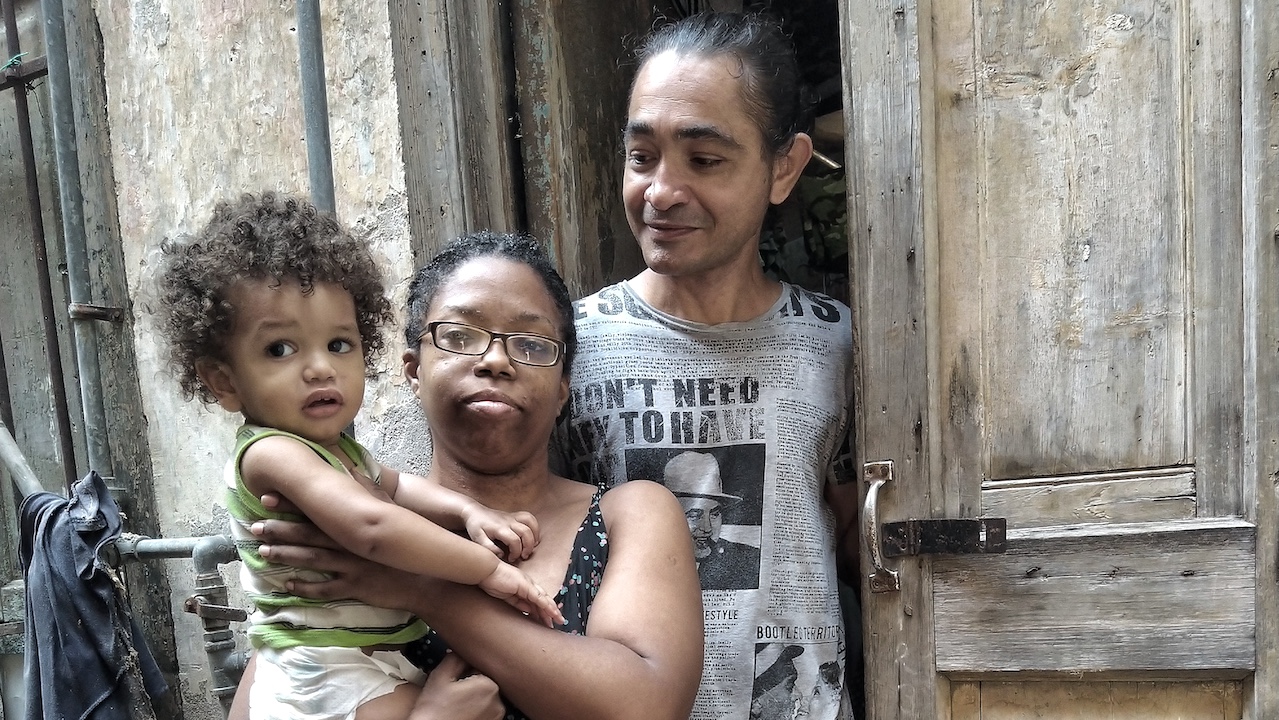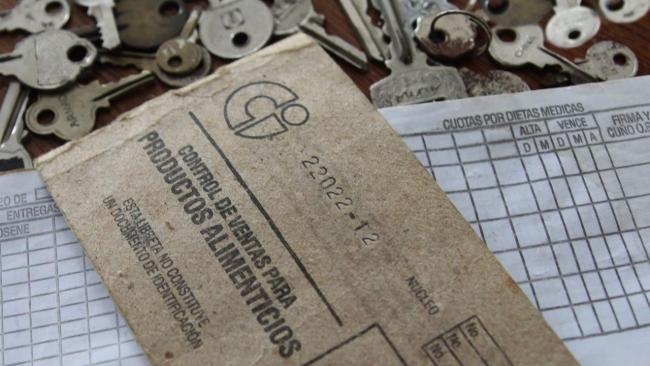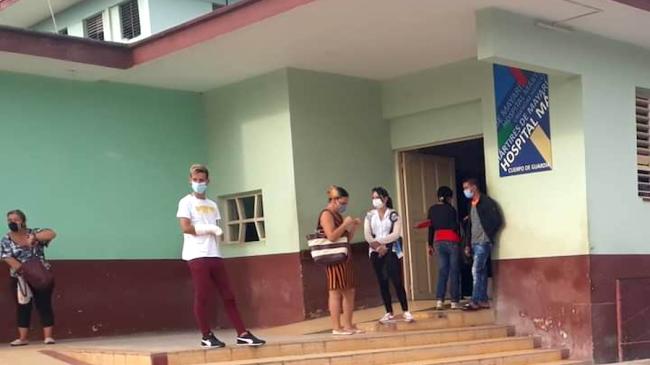Carlos is 41 years old and is going blind. This father lives with his three young children and his wife, Daimara, in extremely precarious housing in Central Havana, one of the most populous municipalities in the Cuban capital. His mother-in-law passed away almost three months ago, after a long ordeal that included dementia.
This family's story is one of the increasingly common ones that can be found among the ruins of Havana, and one in which poverty is a threat to life itself.
A struggle with invisibility and diabetes
The fact that Carlos is gradually losing his sight is a tragedy that has brought more poverty to his household: he used to work as a watchmaker, but he can no longer practice that trade. Now he is unemployed.
He has been diabetic for ten years. He says that he tried to follow a treatment, but was unable to, due to lack of access to medicines, something that has become common in Cuba. The consequences came sooner rather than later: he now suffers from diabetic neuropathy, colitis and retinopathy. Due to his condition, he suffers from bouts of depression and anxiety attacks, which are also not treated because anxiolytics are scarce at state pharmacies.
Diabetes is the eighth leading cause of death in Cuba. According to Ministry of Public Health statistics, Havana ranks second among regions where the disease most reduces the quality of life of those affected.
Orlando Lemus Díaz, a professor at the Dr. Salvador Allende School of Medical Sciences, explained to DIARIO DE CUBA that diabetes is a silent epidemic, and that it is suicide for a patient like Carlos to not have adequate treatment, especially if the disease has progressed uncontrollably.
"Following the treatment is a question of life or death for a patient in Carlos' condition, as the risks of not being medicated are serious for his eyes, kidneys, nerves, skin, heart and blood vessels. If not medicated, this can cause diabetic ketoacidosis: extreme acidity of the blood that results in dehydration of the cells, and the body stops functioning," he said.
12 years asking the state for help
Daimara is also 41 years old and suffers from hypertension. She does not work because she has had to take care of her elderly mother, her husband, and her three children. Amenadiel, the youngest, is two years old and underweight due to a lack of food; Amelia Lucia, nine, is allergic; and Amanda Gabriela, 13, suffers from acute gastritis. None of them receive adequate treatment for their diseases.
According to Dr. Ditsa Vera, a pediatric otolaryngologist, poor quality of life directly affects the health of children, who develop respiratory diseases like asthma and dermatitis. The presence of cockroaches and mites in the house can also affect the children's health, the specialist warned.
"Children should be a priority, and, with them, their homes, which their safe and healthy development largely depends on, as a fundamental human right of children," Vera said. Daimara confesses they only eat two meals a day at home. In the morning there is bread for breakfast, so the children do not go to school on empty stomachs, and nothing else until dinner.
This family's home is in danger of collapsing. The roof is propped up, and the walls have holes because 12 years ago there was a fire in an adjacent room that did severe damage.
Daimara has reported the situation to all the relevant state agencies: the Municipal Housing Directorate, the Ministry of Labor and Social Security, and the State Council. The only answer he she has received is that she "must wait." This mother is tired of being ignored by the authorities, and wonders if some tragedy or disaster has to happen for them to finally be granted a decent home.
Rosalía left, with no memories or hope
Rosalía raised Daimara, her only daughter, alone. She worked all her life as a librarian and received a retirement of 2,000 Cuban pesos, with which she could buy a five-pound package of chicken on the black market, which is where the food is.
The Minister of Labor and Security, Marta Elena Feitó Cabrera, acknowledged on the television program Mesa Redonda that wages and pensions are not enough: "To say that incomes are sufficient at this time would be totally false, because wages have lost purchasing power. This is a reality."
Rosalía died on October 9, at the age of 69. The cause of her death was a myocardial infarction. According to her daughter, 15 days before she died she had suffered a coronary that left her motionless on the floor. She could barely move, even to eat.
She had to be bathed and fed by her daughter, who did her best to care for her mother, without any assistance. The doctor in her area did not visit her, Daimara says, and Rosalía was never transferred to any hospital, due to a lack of ambulances, so she died under the worst circumstances: not eating, or even drinking water, and with an absent gaze.
During her last months of life Rosalía suffered from advanced Alzheimer's, diabetes, hypertension, heart disease, and had suffered two ischemia events that left her disabled. This woman should have had treatment, but pharmacies never had the necessary medications. Her story is one of thousands like it among senior citizens living in Cuba.
According to official information from the Ministry of Public Health, Cuba has had a National Program of Comprehensive Care for the Elderly since 1996, which aims to guarantee healthcare adjusted to the needs of these people and ensure that they live active and healthy lives during old age, but stories like Rosalía's are all too common.
An Aging and Sick Population
The National Office of Statistics (ONEI) reported that in 2021 167,645 people died on the island, and 99,096 were born. That is, there were 68,549 more deaths than births. The population has decreased in 160 of the 168 municipalities in the country, and, according to the Ministry of Public Health, 86.6% of people aged 60 and over suffer from at least one chronic disease. High blood pressure is the most common ailment.
Cuba's elderly population in Cuba is also severely impoverished due to a loss in the purchasing power of their wages and pensions.
In the midst of this scenario, 8 out of 10 Cubans cannot get the medicines they need at pharmacies. 57% get them thanks to the help of churches, 8% through relatives abroad, and 17% through other means, such as the black market, interpersonal solidarity, or bartering, according to a report by the Cuban Human Rights Observatory (OCDH), an NGO founded in 2009 in Madrid, Spain.
The indicators show that poverty levels have increased in recent years, a trend even confirmed by some official data. Over the years the Government of Cuba has touted the island's health system as a great achievement of the Revolution, but today age, illness and a lack of medicines are condemning thousands of people to long and complex afflictions.


